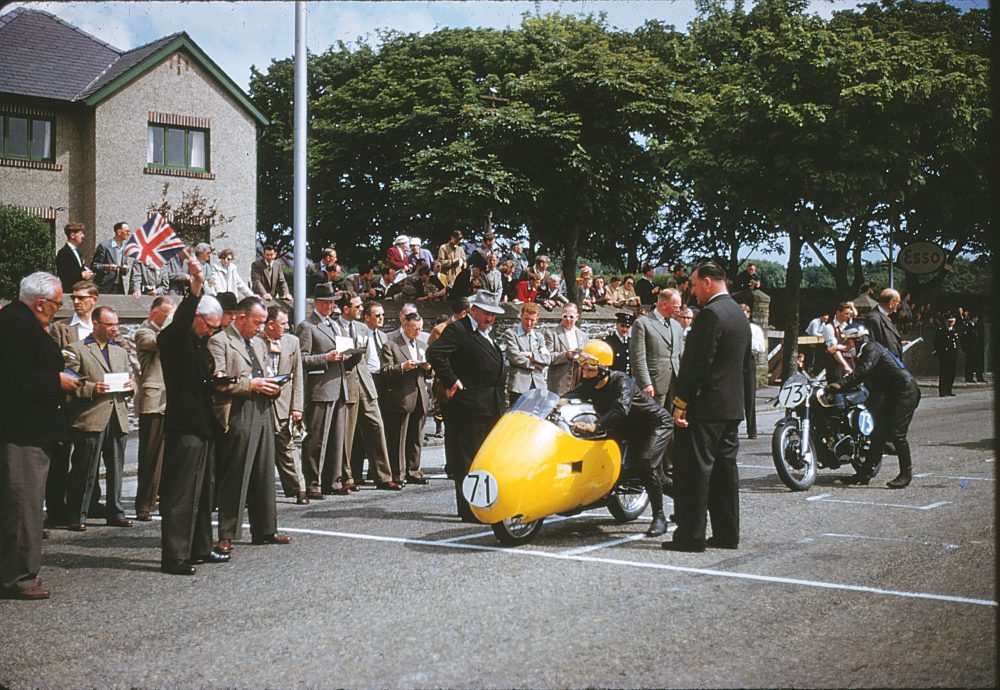Eloquent, witty and fast, a nicer a bloke you’d never meet
Roger Barker was the life of the party,” according to a railwayman Bob Tomlinson, who loaned him a Triumph Tiger 100 for ‘butcher’s picnic’ events near Albury in the mid 1950s. Barker had that effect on people, from his early career as a radio announcer in his birthplace Mudgee, to driving taxis and selling bikes, and an all-too-brief stint on the famed Continental Circus in 1957.
Roger’s motorcycling exploits included Miniature TT dirt-track and competing in the rain-lashed 1954 Redex Trial on a Jawa. Multiple world champion Geoff Duke endorsed his talent in print after racing against him during a Down Under tour in early 1955.
Victories in the 1956 Victorian 350 TT and 1957 Australian 125 GP earned Barker a place in Australia’s official 1957 Isle of Man team. Barker’s 125 sponsor, Jack Walters, paid for two Manx Nortons, which Barker collected in Birmingham. He took with him a bright yellow fibreglass full fairing made by Bob Edmonds in Melbourne. According to Edmonds, “Roger was a very eloquent guy and a real personality.” He certainly stood out with a yellow fairing and matching helmet.
Writing home after his third Continental Circus meeting at St Wendel in the Saarland, Barker says the Australians stayed up all night at the fabulous prize-giving event.
What was the 30-year-old racer’s secret off the track? Elder brother Aub’s wife Joan said he was always ready with five good jokes, often sight gags. But Roger wasn’t just telling a good story. In his TT debut he placed 10th in 1957’s eight-lap 500 TT (the race in which Bob McIntyre posted the first 100mph laps). Next start at Assen, Barker was an impressive eighth in the Dutch 350 and 500 classics.
After Assen, the Australian internationals headed separate ways. The three with works engagements (Keith Campbell, Keith Bryen and Bob Brown) headed to Spa-Francorchamps for the Belgian GP. Barker and Richie Thomson took advantage of markedly better start-money offers to go to Schleiz in East Germany.
Barker qualified fastest for the 350 race. However, race day was blazing hot. It was 40 degrees and he was never comfortable in serious heat. Though in 1957, sports people didn’t know about hydration as they do today.
Both Barker’s races would last more than an hour. It would not be pleasant in black leathers. Nonetheless, Roger led from the start of the 350 race, setting a new outright lap record before retiring with tyre trouble.
In the 500 race, Roger led once again, chased by Germany’s Ernst Hiller on a BMW. But midway through the scheduled 20 laps and on the opposite side of the course from the start/finish, the conditions proved too much. Roger Barker collapsed, falling from his machine in a straight line. He struck a lone apple tree at the side of the circuit and was killed instantly. It was reportedly the first fatality at the circuit, which was first used in 1923.
The devastated Barker family wanted his body brought home. However, Schleiz had no facilities for storing a body. So the locals organised a funeral and buried him in the grounds of the Hilltop Church. The funeral details were extraordinary for a man from 18,000km away who had been in town for a week, with 2000 people mourning. One of the speakers was the chef from a lake cruise boat. He’d met Roger for perhaps a few hours.
Three weeks later, the family’s wishes were honoured when his body was transported to West Germany, flown home and reburied in the Melbourne suburb of Heidelberg.
In 1995, five years after German reunification, Aub and Joan Barker were finally able to visit Schleiz. Looking at the church yard, Aub said it was a pity the family did not leave his brother buried there – because it was a beautiful setting, in a town where he was loved.
While they were in the town, a local photography shop gave Aub a picture of Roger Barker that had been in its front window for 38 years. The Hotel Luginsland maintains a tribute wall to Roger to this day. Sounds like a man you wish you’d met.

WORDS DON COX